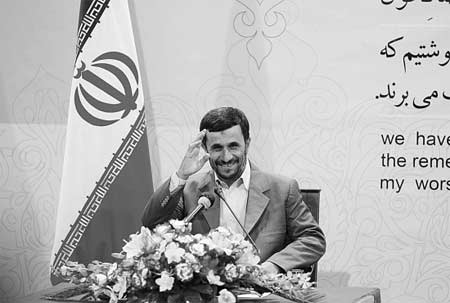 |
|
|
|
环球双语新闻:伊朗战争鼓声加紧(图)http://www.sina.com.cn
2007年10月31日 10:42 钱江晚报
 The prospect of war with Iran is beginning to look real. The hardening of positions in both Tehran and Washington over the past week has brought relations to their lowest point since the Iran hostage crisis that began in 1979. Both sides insist that they seek no military conflict, but tensions on issues ranging from Iran's nuclear program to influence in Iraq and the Arab-Israeli peace process is turning their differences into all-out regional power struggle. Last week, Secretary of State Condeleezza Rice criticized Iran's "emboldened foreign policy" and "hegemonic aspirations," while asserting that the U.S. will continue to be engaged on economic, political and security issues in the Middle East. "We are there to stay," she declared. On the critical issue of Iran's uranium-enrichment program, Tehran and Washington are now engaged in a game of geopolitical chicken, which favors hard-liners on both sides, making compromise more difficult, escalation more likely and war — by accident, if not by design — a greater possibility than before. President Mahmoud Ahmadinejad, after stepping up defiance of U.S.-led efforts to compel Iran to halt enrichment, this week appeared to gain greater domestic influence over the issue with the replacement of Iran's pragmatic top nuclear negotiator by a key Ahmadinejad ally. After President Bush invoked the specter of World War III to press the urgency of stopping Iran, the Administration followed up with another round of punitive measures. Ahmadinejad has repeatedly pooh-poohed the idea that the U.S. might take military action against Iran, to the anger and alarm of others in the Iranian leadership structure, who accuse him of downplaying a real danger. Ahmadinejad says that he considers the U.N.'s case against Iran's nuclear program closed, and dismisses U.N. sanctions as "piles of paper." Bragging that Iran's uranium-enrichment efforts have succeeded in achieving "the capacity for industrial-scale fuel cycle production," A similar hardening of positions has been taking place in Washington, with U.S. rhetoric assuming a more confrontational tone in the past two weeks. On Oct. 17, Bush warned that "if Iran had a nuclear weapon, it would be a dangerous threat to world peace" that risked a third world war. Four days later, Vice President Dick Cheney warned, "The Iranian regime needs to know that if it stays on its present course, the international community is prepared to impose serious consequences... We will not allow Iran to have a nuclear weapon." 环球双语新闻:伊朗战争鼓声加紧(图) 与伊朗开战的前景开始变得真实了。在过去一周内,德黑兰和华盛顿双方的立场都变得越来越强硬,并且使得双方的关系降到了自1979年开始的人质危机以来的最低点。双方都坚持不寻求军事冲突的方法,但是,从伊朗的核计划到伊朗对伊拉克和阿以和平进程的影响等一系列问题上的紧张关系正在使它们的分歧变成对地区性权利的全面争夺。上周,国务卿康多莉扎·赖斯批评伊朗的“胆大妄为的对外政策”和“霸权野心”。她同时强调美国将继续介入中东的经济、政治和安全事务并宣称:“我们将呆在那里。” 在关键性的伊朗铀浓缩计划问题上,德黑兰和华盛顿现在是在玩一种在地缘政治上相互威胁的游戏。这有利于双方的强硬派,使得妥协变得更加困难,紧张升级更加可能,战争的可能性更大,即使是非设计而是偶然引起的战争。马哈茂德·艾哈迈迪-内贾德总统在加强了对美国主导的迫使伊朗停止铀浓缩的努力的蔑视之后,本周通过以他的一个主要的支持者替代伊朗务实的最高核谈判代表这一事件似乎增加了对国内的影响力。在布什总统召唤第三次世界大战的幽灵以促使人们认识阻止伊朗的紧迫性后,美国当局采取了另一轮惩罚性措施。 艾哈迈迪-内贾德反复嘲笑那种认为美国可能对伊朗动武的想法,这触怒了伊朗领导层中那些指责他忽视现实危险的人。他们发出了警告。艾哈迈迪-内贾德说,他认为联合国针对伊朗的行动已经结束了,他嘲笑联合国的制裁是“一堆废纸”。他夸口说,伊朗的铀浓缩努力已经成功地实现了“工业级燃料循环生产的能力”。 华盛顿方面的立场也在变得越来越强硬。过去两周中,美国的措辞带上了更具对抗性的语气。10月17日,布什警告说,“如果伊朗拥有核武器,那将是对世界和平的威胁”,而这有导致第三次世界大战的风险。4天后,副总统迪克·切尼警告说:“伊朗政府需要知道,如果在目前的道路上继续走下去,国际社会将严厉制裁……我们不允许伊朗拥有核武器。”
【发表评论】
不支持Flash
|
||||


